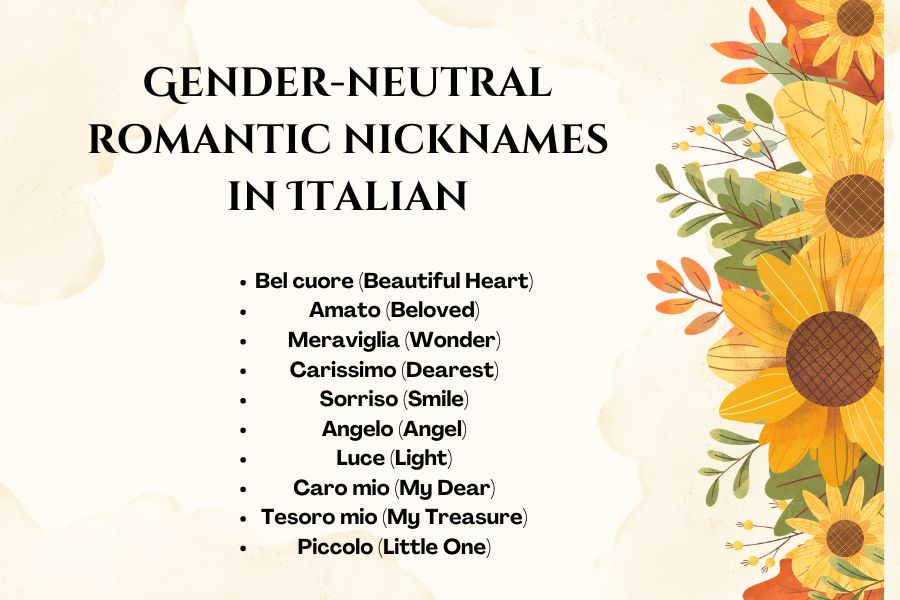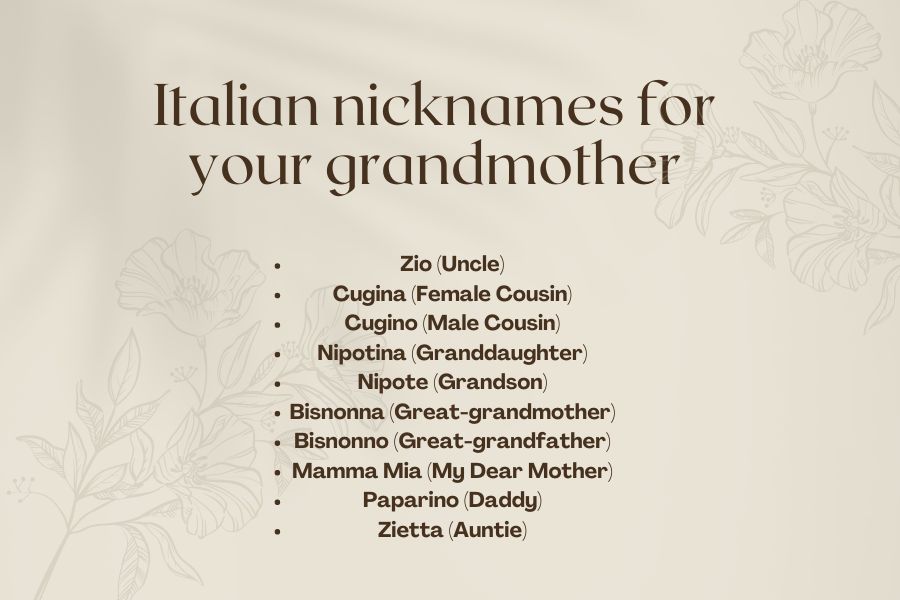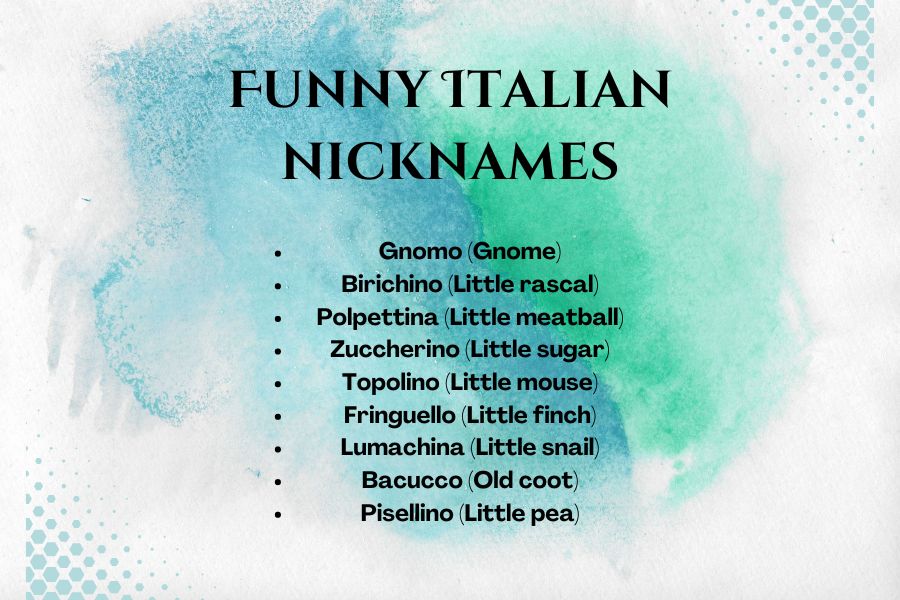Italian nicknames are more than just fun to say. They’re a big part of how people connect in Italy. These nicknames show affection and strengthen relationships. They come up naturally when people talk and move from just knowing each other to becoming closer. These special names often remind people of shared moments or inside jokes, strengthening the bonds between family, friends, and even workmates.

Gender-neutral romantic nicknames in Italian
Italian offers many romantic nicknames that work for anyone, regardless of gender. These terms carry warmth and affection, perfect for expressing love in a way that feels inclusive and timeless. From sweet to playful, discover charming Italian nicknames that highlight love’s universal language.
- Amore (Love)
- Dolcezza (Sweetness)
- Cuore (Heart)
- Stellina (Little Star)
- Gioia (Joy)
- Bel cuore (Beautiful Heart)
- Amato (Beloved)
- Meraviglia (Wonder)
- Carissimo (Dearest)
- Sorriso (Smile)
- Angelo (Angel)
- Luce (Light)
- Caro mio (My Dear)
- Tesoro mio (My Treasure)
- Piccolo (Little One)
- Dolce (Sweet)
- Vita (Life)
- Fiore (Flower)
- Tesoro dolce (Sweet Treasure)
- Dolce amore (Sweet Love)
- Cuoricino (Little Heart)
- Anima (Soul)
- Carino (Cutie)

Husband and boyfriend nicknames in Italian
Exploring Italian nicknames for husbands and boyfriends adds a touch of romance to your relationship. These endearing terms capture Italy’s passionate spirit, making every expression of love feel special. Discover affectionate names that perfectly blend charm and warmth for the man you cherish.
See Also – The Best NYC Slang: 40 Common Sayings And Meanings
- Amore mio (My love)
- Cucciolo (Puppy)
- Caro (Dear)
- Bello (Handsome)
- Principino (Little prince)
- Zucchero (Sugar)
- Anima gemella (Soulmate)
- Amore eterno (Eternal love)
- Sorriso mio (My smile)
- Orso (Bear)
- Sole mio (My sun)
- Stella (Star)
- Vita mia (My life)
- Diamante (Diamond)
- Leone (Lion)
- Piccolo (Little one)
- Tesoro prezioso (Precious treasure)
- Re (King)
- Guerriero (Warrior)
- Dolce metà (Sweet half)

Italian nicknames for your girlfriend or wife
Expressing love with a sweet nickname adds a personal touch to your relationship. Italian offers a variety of charming and heartfelt nicknames perfect for showing affection to your girlfriend or wife. These endearing terms capture the warmth and passion of the Italian language.
- Bella (Beautiful)
- Tesoro (Treasure)
- Cuore mio (My heart)
- Stellina (Little star)
- Cara mia (My dear)
- Principessa (Princess)
- Fiorellina (Little flower)
- Passerotta (Little sparrow)
- Bambolina (Little doll)
- Regina (Queen)
- Baciata (Kissed one)
- Luminosa (Radiant)
- Incanto (Enchantment)
- Sogno (Dream)
- Zuccherina (Little sugar)
- Perla (Pearl)
- Fata (Fairy)
- Orchidea (Orchid)
- Angioletta (Little angel)
- Gemma (Gem)

Italian nicknames for your grandmother and other family members
Explore endearing Italian nicknames for your grandmother and other family members. Each term reflects the warmth, affection, and strong family ties cherished in Italian culture. Whether traditional or unique, these nicknames bring a touch of love to your close relationships.
- Nonna (Grandmother)
- Nonno (Grandfather)
- Mamma (Mother)
- Papà (Father)
- Zia (Aunt)
- Zio (Uncle)
- Cugina (Female Cousin)
- Cugino (Male Cousin)
- Nipotina (Granddaughter)
- Nipote (Grandson)
- Bisnonna (Great-grandmother)
- Bisnonno (Great-grandfather)
- Mamma Mia (My Dear Mother)
- Paparino (Daddy)
- Zietta (Auntie)
- Zione (Big Uncle)
- Cuginetto (Little Cousin)
- Cuginona (Big Cousin)
- Nonnetta (Little Grandma)
- Nonnetto (Little Grandpa)
- Mamma Orsa (Mama Bear)
- Papà Orso (Papa Bear)
- Nipote D’oro (Golden Grandchild)
- Nonnina (Dear Grandma)
- Nonnetta Dolce (Sweet Granny)
- Mamma Cara (Dear Mother)
- Papà Caro (Dear Father)
- Zietta Bella (Beautiful Auntie)
- Zio Forte (Strong Uncle)
- Cugino Piccolo (Little Cousin)
- Nipote Dolce (Sweet Grandchild)
- Nonna Sorriso (Smiling Grandma)
- Nonno Amato (Beloved Grandpa)
- Mamma Del Cuore (Heartfelt Mom)
- Papà Forte (Strong Dad)

Funny Italian nicknames
Italian culture is rich with humor, and this extends to their nicknames. These funny Italian nicknames add a playful touch to relationships, highlighting the warmth and creativity of Italian language and personality. Discover light-hearted and amusing terms you can use with friends, family, or partners, bringing a smile to their faces.
See Also – How To Say Hi In Spanish: Master 10 Essential Greetings
- Cicciobello (Chubby baby)
- Patatone (Big potato)
- Gnomo (Gnome)
- Birichino (Little rascal)
- Polpettina (Little meatball)
- Zuccherino (Little sugar)
- Topolino (Little mouse)
- Fringuello (Little finch)
- Lumachina (Little snail)
- Bacucco (Old coot)
- Pisellino (Little pea)
- Porcellino (Little piggy)
- Puffo (Smurf)
- Micio (Kitty)
- Orsetto (Little bear)
- Furfante (Scoundrel)
- Pasticcino (Little cake)
- Nonnino (Little grandpa)
- Nonnina (Little grandma)
- Moscerino (Little gnat)
- Ciambellino (Little donut)
- Marmotta (Marmot)
- Tigrotto (Little tiger)
- Ricciolino (Little curl)
- Bubu (Boo-boo)
- Pagliaccio (Clown)
- Farfallino (Little butterfly)
- Pesciolino (Little fish)
- Topo Gigio (Little mouse)
- Paperino (Little duck)
- Briciolina (Little crumb)
- Calzino (Little sock)
- Panzone (Big belly)
- Cicciobomba (Chubby bomb)
- Galletto (Little rooster)

Cute Italian nicknames: Food-inspired
Italian nicknames inspired by food bring a sweet touch to any relationship. They reflect affection through the delicious language of cuisine. Whether it’s comparing someone to a tasty treat or a cherished dish, these names offer warmth, comfort, and a bit of fun. Here are some delightful options.
- Biscottino (Little Biscuit)
- Fragolina (Little Strawberry)
- Cioccolatino (Little Chocolate)
- Cannolino (Little Cannoli)
- Patatina (Little Potato)
- Zuccherino (Little Sugar)
- Tiramisuccio (Little Tiramisu)
- Gelatino (Little Gelato)
- Mirtillino (Little Blueberry)
- Pasticcino (Little Pastry)
- Mandorlina (Little Almond)
- Caramellina (Little Caramel)
- Muffinetto (Little Muffin)
- Mieletta (Little Honey)
- Panzerottino (Little Panzerotto)
- Nocciolina (Little Hazelnut)
- Albicocchina (Little Apricot)
- Peschetta (Little Peach)
- Melina (Little Apple)
- Ricottina (Little Ricotta)
- Focaccina (Little Focaccia)
- Grissinetto (Little Breadstick)
- Oliveccina (Little Olive)
- Crostatina (Little Tart)
- Arancinetto (Little Arancini)
- Bombolino (Little Doughnut)
- Marmellatina (Little Jam)
- Torroncino (Little Nougat)
- Pistacchietto (Little Pistachio)
- Budinetto (Little Pudding)
- Caffettino (Little Coffee)
- Ciambellina (Little Donut)
- Croccantino (Little Crunchy Candy)
- Tiramisùccio (Little Tiramisu)
- Panettino (Little Panettone)

Cute Italian nicknames: Animal-inspired
Animal-inspired nicknames in Italian capture the warmth and affection found in nature. These cute terms of endearment highlight charming qualities, making them perfect for expressing love in a playful way. From tiny creatures to majestic animals, these nicknames bring a smile and add a touch of sweetness to any relationship.
See Also – 150 Essential British Slang Meanings And Phrases
- Orsetto (Little Bear)
- Gattino (Kitten)
- Coniglietto (Little Bunny)
- Passerotto (Little Sparrow)
- Topolino (Little Mouse)
- Cagnolino (Little Dog)
- Ranocchio (Little Frog)
- Riccio (Hedgehog)
- Scoiattolo (Squirrel)
- Coccinella (Ladybug)
- Delfino (Dolphin)
- Elefantino (Little Elephant)
- Volpino (Little Fox)
- Lupetto (Little Wolf)
- Tartarughina (Little Turtle)
- Farfallina (Little Butterfly)
- Orsacchiotto (Teddy Bear)
- Pesciolino (Little Fish)
- Leprotto (Little Hare)
- Cavallino (Little Horse)
- Gufetto (Little Owl)
- Maialino (Little Pig)
- Porcellino (Piglet)
- Pinguino (Penguin)
- Grillo (Cricket)
- Scoiattolino (Little Squirrel)
- Cignoletto (Little Swan)
- Pipistrello (Bat)
- Cavalluccio (Seahorse)
- Tigrotto (Little Tiger)
- Serpentino (Little Snake)
- Zanzarino (Little Mosquito)
- Orsetto Polare (Little Polar Bear)
Understanding Italian Nicknames
Diminutive forms
In Italian, adding suffixes like -ino, -ina, -etto, or -etta to nicknames makes them sound more affectionate and intimate. For instance, ‘Paolo’ becomes ‘Paolino,’ and ‘Francesca’ turns into ‘Franceschina.’ These changes make the names cuter and smaller, which people generally find endearing, especially in personal relationships.
Italians often use these diminutive forms in daily conversations. This practice shows how much they value expressing closeness and familiarity through their language. Using these modified names in Italy is a common and heartfelt way to show someone you care.
Augmentative forms
In Italian, some nicknames are twisted by adding endings like—one or—ona, making the words bigger and more intense. This is different from the smaller, cuter versions you see with diminutives.
For example, ‘ragazzo’ means boy, but ‘ragazzone’ turns it into big boy, hinting at someone jovial or strong. Also, ‘amico’ becomes ‘amiconi’, changing friend to big friend, which shows a deep friendship or a very outgoing personality. These larger-than-life nicknames are pretty fun and show a lot of warmth. They highlight how Italians value expressive and deep connections in their relationships.
Unique Categories of Italian Nicknames
Italian nicknames show off the culture and how people connect. They’re more than just sweet nothings. They tell us a lot about Italian life and how people relate to one another.
For example, food-related nicknames like ‘Polpetta,’ which means meatball, are often used to show affection for someone who is a bit chubby or very loved. Animal nicknames like ‘Gattino,’ meaning kitten, show someone is cute or lovable.
There are also playful nicknames like ‘Birichino,’ meaning little rascal, that add a bit of humor to everyday life. Each type of nickname adds something unique to the language and helps people bond. They reflect how the person giving the nickname sees the other person, maybe pointing out something about their looks or personality.
Conclusion
In conclusion, Italian nicknames really brighten up the language and bring people closer. They do more than just sound sweet – they show how warm and open Italian culture is. These nicknames, whether they make a name shorter or longer, each tell their own little story and add a fun twist. Using these nicknames can help you bond better and get a natural feel of how Italians interact.